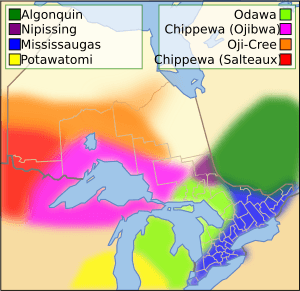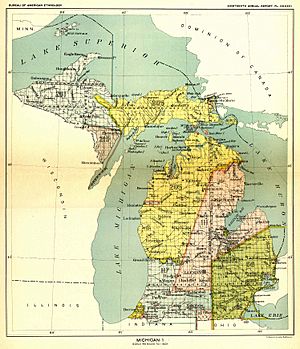Treaty of Chicago facts for kids
The Treaty of Chicago refers to two important agreements signed in the area that later became Chicago, Illinois. These treaties were made between the United States government and the Odawa (also known as Ottawa), Ojibwe (also known as Chippewa), and Potawatomi (also known as Bodéwadmi) peoples. These three groups are often called the Council of Three Fires. The first treaty was signed in 1821, and the second in 1833.
Contents
Why Were These Treaties Needed?
Before these treaties, other agreements had already set the stage. In 1795, a small part of the Treaty of Greenville gave the United States rights to a six-mile area at the mouth of the Chicago River. Later, in 1816, the Treaty of St. Louis gave even more land in the Chicago area to the United States. This included the Chicago Portage, which was an important water route.
The 1821 Treaty of Chicago
The first Treaty of Chicago was signed on August 29, 1821. It was officially announced on March 25, 1822. Lewis Cass, the governor of the Michigan Territory, and Solomon Sibley signed for the United States. Leaders from the Ottawa, Ojibwe, and Potawatomi nations (the Council of Three Fires) signed for their people.
In this treaty, the Native American nations gave up all their lands in the Michigan Territory south of the Grand River. They kept a few small areas for themselves. They also gave up a strip of land that connected Detroit and Chicago, running through Indiana and Illinois along the southern coast of Lake Michigan. Some specific Native American individuals were also given rights to certain pieces of land.
Metea's Speech: A Powerful Message
During the signing of the 1821 Treaty of Chicago, a Potawatomi chief named Metea gave a very strong speech. He spoke about why his people wanted to keep their land. Here is part of what he said:
My Father,—We have listened to what you have said. We shall now retire to our camps and consult upon it. You will hear nothing more from us at present.
[After thinking it over, Metea continued:]
We meet you here to-day, because we had promised it, to tell you our minds, and what we have agreed upon among ourselves. You will listen to us with a good mind, and believe what we say. You know that we first came to this country, a long time ago, and when we sat ourselves down upon it, we met with a great many hardships and difficulties. Our country was then very large; but it has dwindled away to a small spot, and you wish to purchase that! This has caused us to reflect much upon what you have told us; and we have, therefore, brought all the chiefs and warriors, and the young men and women and children of our tribe, that one part may not do what others object to, and that all may be witnesses of what is going forward. You know your children. Since you first came among them, they have listened to your words with an attentive ear, and have always hearkened to your counsels. Whenever you have had a proposal to make to us, whenever you have had a favor to ask of us, we have always lent a favorable ear, and our invariable answer has been 'yes.' This you know! A long time has passed since we first came upon our lands, and our old people have all sunk into their graves. They had sense. We are all young and foolish, and do not wish to do anything that they would not approve, were they living. We are fearful we shall offend their spirits, if we sell our lands; and we are fearful we shall offend you, if we do not sell them. This has caused us great perplexity of thought, because we have counselled among ourselves, and do not know how we can part with the land. Our country was given to us by the Great Spirit, who gave it to us to hunt upon, to make our cornfields upon, to live upon, and to make down our beds upon when we die. And he would never forgive us, should we bargain it away. When you first spoke to us for lands at St. Mary's, we said we had a little, and agreed to sell you a piece of it; but we told you we could spare no more. Now you ask us again. You are never satisfied! We have sold you a great tract of land already; but it is not enough! We sold it to you for the benefit of your children, to farm and to live upon. We have now but little left. We shall want it all for ourselves. We know not how long we may live, and we wish to have some lands for our children to hunt upon. You are gradually taking away our hunting-grounds. Your children are driving us before them. We are growing uneasy. What lands you have, you may retain forever; but we shall sell no more. You think, perhaps, that I speak in passion; but my heart is good towards you. I speak like one of your own children. I am an Indian, a red-skin, and live by hunting and fishing, but my country is already too small; and I do not know how to bring up my children, if I give it all away. We sold you a fine tract of land at St. Mary's. We said to you then, it was enough to satisfy your children, and the last we should sell: and we thought it would be the last you would ask for. We have now told you what we had to say. It is what was determined on, in a council among ourselves; and what I have spoken, is the voice of my nation. On this account, all our people have come here to listen to me; but do not think we have a bad opinion of you. Where should we get a bad opinion of you? We speak to you with a good heart, and the feelings of a friend. You are acquainted with this piece of land—the country we live in. Shall we give it up? Take notice, it is a small piece of land, and if we give it away, what will become of us? The Great Spirit, who has provided it for our use, allows us to keep it, to bring up our young men and support our families. We should incur his anger, if we bartered it away. If we had more land, you should get more; but our land has been wasting away ever since the white people became our neighbors, and we have now hardly enough left to cover the bones of our tribe. You are in the midst of your red children. What is due to us in money, we wish, and will receive at this place; and we want nothing more. We all shake hands with you. Behold our warriors, our women, and children. Take pity on us and on our words.
The 1833 Treaty of Chicago
The second Treaty of Chicago was signed in 1833. In this agreement, the Potawatomi people gave the United States government all their land west of Lake Michigan up to Lake Winnebago in what is now Wisconsin. This treaty also included lands that are part of modern-day Illinois.
In return for their lands, the Potawatomi people were promised different cash payments and new areas of land west of the Mississippi River.
The Last War Dance in Chicago
At the final ceremony for the 1833 treaty in 1835, just before the Native Americans were moved from their lands, about five hundred warriors gathered in the young city of Chicago. They were dressed in full traditional clothing and carried tomahawks. They performed the last recorded war dance in the Chicago area. This was a powerful and emotional moment before they left their ancestral lands.
See also
 In Spanish: Tratado de Chicago para niños
In Spanish: Tratado de Chicago para niños
 | Laphonza Butler |
 | Daisy Bates |
 | Elizabeth Piper Ensley |



